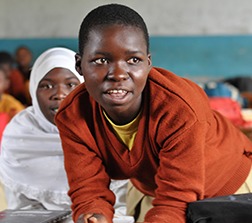- About
- Topics
- Picks
- Audio
- Story
- In-Depth
- Opinion
- News
- Donate
- Signup for our newsletterOur Editors' Best Picks.Send
Read, Debate: Engage.
| December 31, 2020 | |
|---|---|
| topic: | Child rights |
| tags: | #sanitary pads, #women, #girls, #Ethiopia, #Menstruation, #women's rights |
| located: | Ethiopia |
| by: | Bob Koigi |
For school going girls, this has meant missing schools with one out of every ten girls skipping classes. In rural areas the numbers go as high as five which has seen a growing number of school dropouts eventually leading to early pregnancies and marriages as coping mechanisms. Cumulatively, girls skip up to 50 days of school each year as a result of period poverty and stigma.
Menstruation in Ethiopia and other developing countries is still treated as a taboo with girls ostracised and mocked.
Freweini Mebrahtu from Northern Ethiopia, knows this too well having had a similar experience in her youth. She had heard that having periods was a curse and that it meant she was ready for marriage. She, like most girls, suffered in silence, and unable to access sanitary pads, she would use rags.
The harrowing experience would inspire her to invest in the hygiene of girls many years later after she graduated with a degree in Chemical Engineering from the US. In 2005 she designed a reusable low cost menstrual pad that to date has given thousands of girls a new lease of life and kept them in school. The pads are washable, and contain absorbent lining made of cotton and a waterproof backing which are attached to the underwear by a button. The pads cost 20 Ethiopian Birr, less than a dollar, and with proper care can go up to two years. To reach more girls, Mebrahtu started Mariam Seba Sanitary Products Factory, named after her daughter, which she uses to mass produce the pads. Each year the company produces 750,000 pads with close to 800,000 girls and women having benefited from them since she began operations.
When Mebrahtu met Dr. Lewis Wall a US professor of obstetrics and gynecology, he was full of praise for her work and in 2014 started an NGO Dignity Period to assist her in advancing her work. The organisation has so far distributed over 150,000 free menstrual hygiene kits which it has purchased from Mariam Seba Sanitary Products Factory. It says that through this intervention more girls are going back to classes with a recorded 24 per cent increase in school attendance among girls.
The organisation has also collaborated with Ethiopia’s Mekelle University in conducting trainings and workshops that have far reached over 300,000 students. The workshops targeting both girls and boys are meant to debunk the dominant belief that menstruation is a curse and equip learners with information on how and why periods occur with a view to changing perceptions. Mebrahtu is actively involved as a speaker in these workshops.
Her efforts have earned her global recognition and admiration. She was recently voted the 2019 CNN Hero of the year for her fervent pursuit to keep girls in school and end taboo associated with menstruation. The annual fete honours men and women making a contribution at making the world a better place for all. “I don’t know what to say. This moment is for all the girls and women everywhere. Dignity for all,” she said when she received the award.
Mebrahtu’s efforts at maintaining the dignity of girls in their menses is one of the numerous interventions especially in Africa where innovators have been exploring low cost, durable and reusable sanitary pads as a way of ensuring quality menstrual hygiene management. This comes as cases of the continent continues experiencing cases of period shaming which have resulted into girls sinking into depression or opting for suicide. These innovators are using locally available materials including sugarcane, banana leaves and papyrus to invent some of the most globally acclaimed menstrual hygiene products that are redefining the approach to handling periods especially for the poor rural women and girls.
While legislation and policies haven’t fully favoured girls, programmes on free distribution of sanitary pads by governments and scrapping of tax on sanitary products in countries like Kenya, Zambia, South Africa and Botswana have been pivotal in bolstering efforts meant to ensure no girl misses school.
By copying the embed code below, you agree to adhere to our republishing guidelines.
